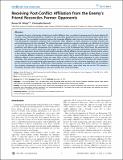Files in this item
Receiving post-conflict affiliation from the enemy's friend reconciles former opponents
Item metadata
| dc.contributor.author | Wittig, Roman Martin | |
| dc.contributor.author | Boesch, Christophe | |
| dc.date.accessioned | 2013-11-05T13:01:01Z | |
| dc.date.available | 2013-11-05T13:01:01Z | |
| dc.date.issued | 2010-11-15 | |
| dc.identifier | 4531995 | |
| dc.identifier | 95346aa2-7532-4b4e-9658-2b636aa113a5 | |
| dc.identifier | 78649549129 | |
| dc.identifier.citation | Wittig , R M & Boesch , C 2010 , ' Receiving post-conflict affiliation from the enemy's friend reconciles former opponents ' , PLoS One , vol. 5 , no. 11 , e13995 . https://doi.org/10.1371/journal.pone.0013995 | en |
| dc.identifier.issn | 1932-6203 | |
| dc.identifier.uri | https://hdl.handle.net/10023/4167 | |
| dc.description.abstract | The adaptive function of bystander initiated post-conflict affiliation (also: consolation & appeasement) has been debated for 30 years. Three influential hypotheses compete for the most likely explanation but have not previously been tested with a single data set. The consolation hypothesis argues that bystander affiliation calms the victim and reduces their stress levels. The self-protection hypothesis proposes that a bystander offers affiliation to either opponent to protect himself from redirected aggression by this individual. The relationship-repair hypothesis suggests a bystander can substitute for a friend to reconcile the friend with the friend’s former opponent. Here, we contrast all three hypotheses and tested their predictions with data on wild chimpanzees (Pan troglodytes verus) of the Taı¨ National Park, Coˆ te d’Ivoire. We examined the first and second post-conflict interactions with respect to both the dyadic and triadic relationships between the bystander and the two opponents. Results showed that female bystanders offered affiliation to their aggressor friends and the victims of their friends, while male bystanders offered affiliation to their victim friends and the aggressors of their friends. For both sexes, bystander affiliation resulted in a subsequent interaction pattern that is expected for direct reconciliation. Bystander affiliation offered to the opponent’s friend was more likely to lead to affiliation among opponents in their subsequent interaction. Also, tolerance levels among former opponents were reset to normal levels. In conclusion, this study provides strong evidence for the relationship-repair hypothesis, moderate evidence for the consolation hypothesis and no evidence for the self-protection hypothesis. Furthermore, that bystanders can repair a relationship on behalf of their friend indicates that recipient chimpanzees are aware of the relationships between others, even when they are not kin. This presents a mechanism through which chimpanzees may gain benefits from social knowledge. | |
| dc.format.extent | 10 | |
| dc.format.extent | 445308 | |
| dc.language.iso | eng | |
| dc.relation.ispartof | PLoS One | en |
| dc.rights | © 2010 Wittig, Boesch. This is an open-access article distributed under the terms of the Creative Commons Attribution License, which permits unrestricted use, distribution, and reproduction in any medium, provided the original author and source are credited. | en |
| dc.subject | Chimpanzees | en |
| dc.subject | Aggression | en |
| dc.subject | Post-conflict affiliation | en |
| dc.subject | Bystander affiliation | en |
| dc.subject | Self-protection hypothesis | en |
| dc.subject | Relationship-repair hypothesis | en |
| dc.subject | Social knowledge | en |
| dc.title | Receiving post-conflict affiliation from the enemy's friend reconciles former opponents | en |
| dc.type | Journal article | en |
| dc.contributor.institution | University of St Andrews.School of Psychology and Neuroscience | en |
| dc.identifier.doi | 10.1371/journal.pone.0013995 | |
| dc.description.status | Peer reviewed | en |
This item appears in the following Collection(s)
Items in the St Andrews Research Repository are protected by copyright, with all rights reserved, unless otherwise indicated.

